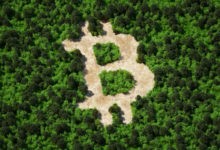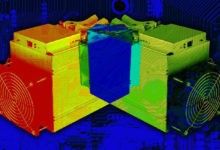Guatemalan Town Cleans Local Lake Using Bitcoin Miners

A Guatemalan circular Bitcoin economy known as “Bitcoin Lake” is leveraging Bitcoin ASICs to clean the nearby Lake Atitlán while generating income for the community.
As Bitcoin Lake Founder Patrick Melder explained, the “Kaboom” mining project is repurposing used cooking oil to help mine Bitcoin, rather than pollute the local environment.
Mining Helping the Environment?
As Melder told Bitcoin Magazine, the project is a follow-up to prior attempts at cleaning the lake that were ultimately both costly and unsuccessful.
“Within the past five years, a major effort to clean the lake costing upwards of $300 million failed because it was so complex with so many large stakeholders who couldn’t agree on a solution,” he added.
By contrast, Bitcoin Lake took a bottom-up approach to ecological sustainability. It involves repurposing used cooking oil to mine Bitcoin, which would otherwise be thrown into the street or the landfill that stood above Lake Atitlán.
“Either way, it would find its way into the watershed and into the lake,” said Melder. By contrast. while the mining process does produce carbon dioxide, it reduces contamination of the lake.
Bitcoin Lake shared a video of the project in action earlier this month. Under one tent, the founder kept multiple containers of used cooking oil, a generator, ASICs, and a laptop tracking the hashes being generated. Both the generator and ASICs are old, recycled models, but have found a “second life” thanks to the “nearly free energy” provided by seed oils.
The founder hopes to popularize the initiative in neighboring communities as they realize they can feasibly and profitably clean the environment.
In the United States, concerns about Bitcoin Mining’s negative impact on the environment are still commonplace among regulators. However, multiple reports have outlined ways that it can help heal the environment, such as by flaring excess natural gas.
Spreading Bitcoin Adoption
Melder’s broader “Bitcoin Lake” project – of which “Kaboom” is a part – has three goals: cleaning the lake, educating the community about Bitcoin, and creating a circular Bitcoin economy. That includes spreading Bitcoin’s adoption as a store of value, medium of exchange, and unit of account.
“The truly virtuous circular #Bitcoin economy is to use every form of wasted energy to mine BTC and secure the network. In the process – distributing income BACK INTO THE COMMUNITY,” tweeted Bitcoin Lake on September 12th.
The project was inspired by El Salvador’s Bitcoin Beach, where various Bitcoin-friendly initiatives have taken hold. However, unlike the Salvadoran example, Bitcoin Lake had no large endowment or donations to kickstart its operations. Mining, however, is helping to get Bitcoin into the economy.
Regarding education, the project has already Bitcoin-related material into the local education centre. Since January, children in the area have been learning core concepts such as ‘what is inflation’ and even ‘what is money’ – ideas that some say traders on Wall Street struggle to grasp.
Educational meetings for adults, businesses, and indigenous community leaders are also present. Overall, the initiative is meant to inspire natural adoption through education, rather than coercion that catches businesses off guard.
In El Salvador, many objected to the Bitcoin Law upon its implementation last year, which included a stipulation to force businesses to accept Bitcoin. President Bukele clarified later that the detail only applied to large corporations in practice.
“Since we’ve started in January of this year, we’ve onboarded over 60 businesses in and around Panajachel, and in Guatemala as a whole we have about 200 businesses that we have onboarded to accept bitcoin,” Melder explained.






 Bitcoin
Bitcoin  Ethereum
Ethereum  Tether
Tether  USDC
USDC  TRON
TRON  Dogecoin
Dogecoin  Cardano
Cardano  Bitcoin Cash
Bitcoin Cash  Monero
Monero  Chainlink
Chainlink  LEO Token
LEO Token  Stellar
Stellar  Zcash
Zcash  Litecoin
Litecoin  Hedera
Hedera  Dai
Dai  Cronos
Cronos  OKB
OKB  Tether Gold
Tether Gold  Ethereum Classic
Ethereum Classic  KuCoin
KuCoin  Cosmos Hub
Cosmos Hub  Gate
Gate  Algorand
Algorand  VeChain
VeChain  Dash
Dash  Tezos
Tezos  Stacks
Stacks  TrueUSD
TrueUSD  IOTA
IOTA  Decred
Decred  Theta Network
Theta Network  Basic Attention
Basic Attention  NEO
NEO  Synthetix
Synthetix  Qtum
Qtum  0x Protocol
0x Protocol  Ravencoin
Ravencoin  Zilliqa
Zilliqa  DigiByte
DigiByte  Nano
Nano  Siacoin
Siacoin  Numeraire
Numeraire  Waves
Waves  Enjin Coin
Enjin Coin  Ontology
Ontology  Status
Status  BUSD
BUSD  Hive
Hive  Pax Dollar
Pax Dollar  Lisk
Lisk  Steem
Steem  Huobi
Huobi  OMG Network
OMG Network  Bitcoin Gold
Bitcoin Gold  NEM
NEM  Augur
Augur